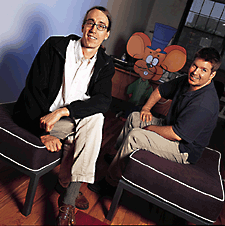Alumni
newsmaker:
>
> Michael
Cirks and Paul Hudson, both AB'87, have built a family-oriented
Web community
 In
March, Michael Cirks, AB'87, presented Paul Hudson, AB'87, with
a brand-new guitar.
The gift was not only a reminder of their first, chance meeting
in a U of C music practice room, but also a token of celebration:
FunBrain.com, their interactive educational Web site for K-12
classrooms, had just merged with FamilyEducation Network, an Internet
community for parents, students, and teachers. Cirks, who founded
the site with Hudson, feels the acquisition will help FunBrain
expand its audience, reinforce "the learning triangle"--the student-parent-teacher
relationship--and bring FunBrain into contact with such big-time
investors as Harcourt, America Online, and Intel.
In
March, Michael Cirks, AB'87, presented Paul Hudson, AB'87, with
a brand-new guitar.
The gift was not only a reminder of their first, chance meeting
in a U of C music practice room, but also a token of celebration:
FunBrain.com, their interactive educational Web site for K-12
classrooms, had just merged with FamilyEducation Network, an Internet
community for parents, students, and teachers. Cirks, who founded
the site with Hudson, feels the acquisition will help FunBrain
expand its audience, reinforce "the learning triangle"--the student-parent-teacher
relationship--and bring FunBrain into contact with such big-time
investors as Harcourt, America Online, and Intel.
 |
| Cirks
and Hudson opted for a poster e-business they could also be
proud of. |
Receiving
more than 35 million hits a month, Chicago-based FunBrain.com
is one of the five most popular children's sites on the Web, according
to the January 3 issue of Advertising Age. Using 50 interactive
educational games with names like Math Baseball, Grammar Gorillas,
and Proton Don, FunBrain sparks the interest of kids from ages
6 to 17 in math, English, geography, and more. Though American
kids make up about 90 percent of their audience, Cirks notes that
they have also received enthusiastic feedback from physics students
at the University of Oxford, and students in Singapore. Meanwhile,
teachers can sign on to FunBrain's Quiz Lab to create on-line
quizzes or to access thousands of other teachers' quizzes in the
Quiz Library. "Our goal is to empower kids in their own education
and to make learning fun," says Hudson. "But we've also expanded
our focus by adding tools to make the teacher's job easier and
richer."
The
site is also expanding its appeal to parents, who can join in
on games such as the Kid vs. Parent Brain Bowl, which covers weekly
current events. Soon they'll be able to access the Smarter Chart,
now under construction, which will send e-mail updates on what
skills their children need to practice.
Neither
Cirks nor Hudson has a background in education, but Hudson's sister
and Cirk's wife, mother, aunts, and uncles are all teachers who
have given them invaluable advice. The co-founders put their relatives'
recommendations to use by making additions and changes to the
site to better suit its visitors. "FunBrain owes its success to
its users--kids and teachers--who offer us the best suggestions
for improvements," says Hudson. The two do, however, draw on their
business experience, having traded Eurodollar options after graduation.
In 1992, they also co-founded PMpublishing, a software firm that
develops risk-management and training programs for futures options
traders. The business is still up and running, but Cirks and Hudson
now spend the bulk of their time on FunBrain.
According
to the duo, running an Internet business is more challenging than
running a traditional business because of the pace of change.
Nor do they charge for their product, keeping their site free
to all users and depending mostly on their advertisers for income.
"Our philosophy is that everything on the Internet should be free,"
says Hudson. As the cost to get on-line drops, he believes, the
Internet will become more dependent on advertising revenues.
While
running a free, educational Web site isn't the most profitable
career, Cirks and Hudson don't measure their work's rewards in
dollars. "We may have passed up more lucrative choices, but we
couldn't be happier with what we're doing," says Hudson. "Rather
than framing our first dollar earned, we've saved the e-mail that
says, 'I used to get an F in math and now I got a C and now my
life is great.'" --E.C.



![]()
 In
March, Michael Cirks, AB'87, presented Paul Hudson, AB'87, with
a brand-new guitar.
The gift was not only a reminder of their first, chance meeting
in a U of C music practice room, but also a token of celebration:
FunBrain.com, their interactive educational Web site for K-12
classrooms, had just merged with FamilyEducation Network, an Internet
community for parents, students, and teachers. Cirks, who founded
the site with Hudson, feels the acquisition will help FunBrain
expand its audience, reinforce "the learning triangle"--the student-parent-teacher
relationship--and bring FunBrain into contact with such big-time
investors as Harcourt, America Online, and Intel.
In
March, Michael Cirks, AB'87, presented Paul Hudson, AB'87, with
a brand-new guitar.
The gift was not only a reminder of their first, chance meeting
in a U of C music practice room, but also a token of celebration:
FunBrain.com, their interactive educational Web site for K-12
classrooms, had just merged with FamilyEducation Network, an Internet
community for parents, students, and teachers. Cirks, who founded
the site with Hudson, feels the acquisition will help FunBrain
expand its audience, reinforce "the learning triangle"--the student-parent-teacher
relationship--and bring FunBrain into contact with such big-time
investors as Harcourt, America Online, and Intel.